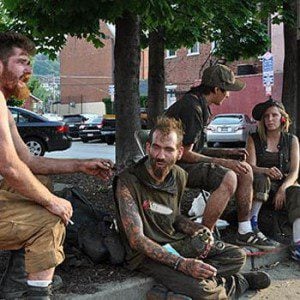 As part of my year-long quest to better, more fully and authentically follow the life and teachings of Jesus (a spiritual practice I’ve called My Jesus Project), I’m working this month with Christian Anarchist mentor Mark Van Steenwyk on exploring “Jesus the Radical.” The first task he gave me was simple, though not necessarily easy (like a lot of Jesus’ teaching, incidentally). He told me to reduce the amount of time I spent driving myself places, opting instead for public transport and walking whenever possible.
As part of my year-long quest to better, more fully and authentically follow the life and teachings of Jesus (a spiritual practice I’ve called My Jesus Project), I’m working this month with Christian Anarchist mentor Mark Van Steenwyk on exploring “Jesus the Radical.” The first task he gave me was simple, though not necessarily easy (like a lot of Jesus’ teaching, incidentally). He told me to reduce the amount of time I spent driving myself places, opting instead for public transport and walking whenever possible.
Rather than being some form of quiet protest against the consumer-industrial complex or some expression of solidarity with the earth, it’s actually just about people. It’s all too easy to go from our homes to our garages, then cars, then offices and back again without really connecting meaningfully with anyone. As such, it’s easy to slip into a routine of isolation, in which we exist in a self-validating echo chamber, further strengthening our ideologies, but at the expense of our human connections.
Put more simply, Jesus would have told us to get off of our asses and engage people face-to-face more often.
This practice has already presented several interesting opportunities. In addition to simply walking or riding around, part of the practice’s intent is to look people in the eye (not in a creepy stalker way) and try to really recognize their humanity, beyond any initial reflex of categorizing them as some kind of “other.” From here, the hope and trust is that we make awareness, compassion and human connection an intentional spiritual practice, from which stronger, more Christ-like community will emerge over time.
The first “opportunity” came in the form of David, who asked me for some money on the street. Instead, my six-year-old daughter and I offered to share a meal with him. He accepted and asked for a bowl of chili and a large coffee from the shop next door. We went in to order and to take everything outside to the patio (he felt more comfortable there instead of inside, and based on his hygiene, I thought it was best for all), when Zoe pointed to him through the window.
“Daddy,” she said, “is David itchy?” I’ve actually met David a few times, and I’ve known him to slip in and out of schizophrenic episodes pretty seamlessly. When he does so, he scratches himself habitually, to which the folks in the restaurant cringed as he stared at the, mumbling all the while.”
“Yeah baby,” I said, “at least his brain tells him he is. See, David’s brain has something that makes him sick, kind of like when you have a cold.”
“Then he should take some medicine.”
“Probably so,” I said, “but sometimes when you get a brain sickness, it makes you not want to take the medicine that will help you. Then it’s hard to do anything else to take care of yourself.”
“So that’s why he walks around in a sleeping bag instead of going to a home?”
“That’s right.”
“That’s so sad,” she looked down. Her averted eyes were well timed, as by now, David had taken to masturbating under his clothes while looking at two women through the window.
“Excuse me,” I said, to the woman behind the counter, “can you cancel our order except for the chili and coffee? Oh, and you should probably make that to go.” After handing him his meal, I shook David’s hand – the other hand – though he was mid-episode and didn’t seem to really know who I was anymore.
The next day, I stood behind a man in line at the pharmacy who actually reminded me of some of the “bangers” I knew back in Pueblo, Colorado: a town notorious for a heavy gang presence. On one cheekbone, he had the word “MONEY” tattooed, and along the other was “POWER.” My first reaction was to judge him both for defacing his body that way (unlike the sensible, responsible ways I’ve been tattooed, mind you), and for being so superficial about his priorities. Then it occurred to me that, in a culture where both money and power are likely scarce, this is probably a representation of freedom from a seemingly helpless cycle.I
He was faced the other way, so I couldn’t make eye contact, but from the side, his glare communicated “don’t screw with me.” But after he walked away, I remembered a woman in her eighties named Billie from Milagro, the church we started back in Pueblo eleven years ago. The second time she met Chuck, a newcomer who was tattooed and pierced, head to toe, she took his hand and looked him in the eye, smiling.
“Your tattoos are amazing,” she said. “Would you mind telling me about them?” Not surprising, Chuck adored Billie from then on, and she, him.
Finally, I took the train from beginning to end recently, from the airport on the far northeast edge of town to my home in the southwest. When we got further in downtown, the requisite “Crusties” boarded, complete with several dogs, a gallon jug of what they proudly announced was orange juice and vodka, and a vaporizer full of weed. There’s a pretty robust constituency of teenage and twenty-something folks in Portland who choose to live on the streets (at least by day; some of them go home to apartments or couch surf at night) as a way of life. The panhandle though they are generally able-bodied, and they make a point of pushing your tolerance level to – or even – beyond its breaking point.
Though I was one of the only people on the train, they sat on three benches, completely surrounding me. Though their shouting and general obnoxiousness was evidence enough of their presence, the smell was an equal assault on the senses.
My initial response is generally contempt, as they seem happy to live off of the generosity of others, while apparently able on some level to provide for themselves if they wanted to. One of them even referred to one of their friends as a “Trustafarian,” which was a phrase I learned back in Colorado to describe a trust fund kid who still tried to embrace a street “Crusty” lifestyle.
Suffice it to say I don’t really relate. And yes, I held on to my phone a little tighter as they spit, swore and carried on, almost literally in my face, as if to say, “can you handle me?” But then I listened more carefully to the substance of what they were talking about, beyond the bombast. They shared stories about friends, both those they were looking forward to seeing and ones with whom they had lost touch. They were excited to be headed to Goose Hollow where a cohort of their tribe were gathering to be together for the first time in a long while. aside from the context, it was not unlike an evening we would look forward to with our friends.
And then, in a quieter tone, off to the side, I heard one of the guys talking his girlfriend about names he had been dreaming of for their kids once they got married and made a life together. And that’s when The judgmental fog began to lift and I realized that the rest was really just superficial bullshit. At their core, they wanted exactly the same things from life I did, or any of us do. They wanted community, family, relationship and love.
As their stop neared, the couple resumed their profane back-and-forth with the rest of their friends, grabbing their backpacks and milk jugs to go join their friends. As they girl across from me stood up, she glanced at me, just for a second. She was the one whose boyfriend was dreaming of family with er, someday, in some other context. I smiled, imagining her lovingly holding that as-yet-only-imaginary baby in her arms, looking at it with the same love that every mother and father should experience with their newborn.
“Have a good night,” I said. She offered a timid half smile and hopped off the train with the rest of the Crust Punks, disappearing into the dark at the stop in Goose Hollow.












